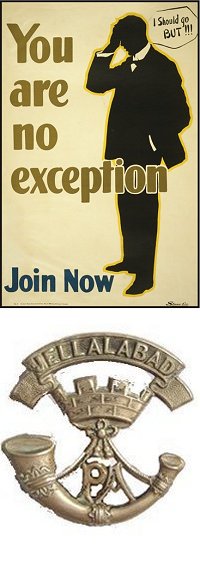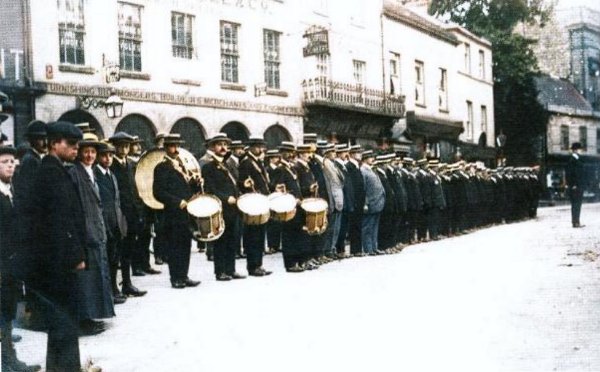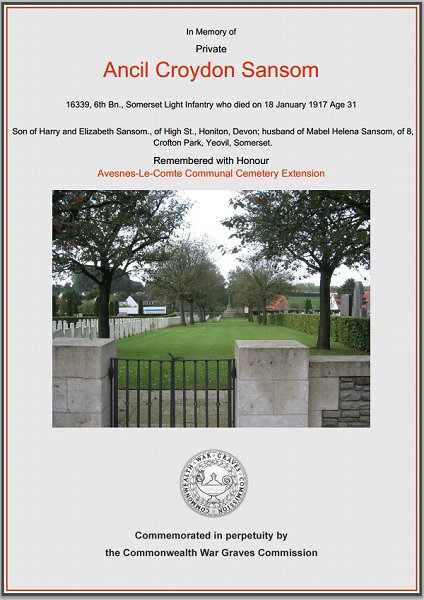yeovil at War
Ancel Croydon Sansom
Died of pneumonia while on active service
Ancel Croydon Sansom was born in Honiton, Devon, in 1886 the son of bricklayer Harry Sansom (b 1857) and Elizabeth née Croydon (b 1859). In the 1891 census Harry and Elizabeth were listed living in Honiton with their children Mildred (b 1884), Ancel and Rose (b 1888). Also living with them was Elizabeth's father, Henry Croydon. In 1901 the family were still living in Honiton, Harry gave his occupation as a mason while 15-year-old Ancel gave his occupation as a domestic gardener. In 1911, still in Honiton, 25-year-old Ancel listed his occupation as an Assistant Draper and he would later put his experience to practical use by working at Redwood's store in the Borough.
In the spring of 1913 Ancel married Mabel Helena Hawkins (1881-1966) at Yeovil and the couple set up home at 8 Crofton Park. They were to have one son. However Ancel had also probably served with the Volunteer Battalion of the Somerset Light Infantry, or at least had some form of military experience, and was consequently a National Reservist.
 Since
Ancel was a
member of the
Yeovil Company
of the National
Reserve, he
enlisted at
Yeovil on the
outbreak of war,
joining the 6th
Battalion,
Somerset Light
Infantry
(Service No
16339). In fact
he may, indeed,
be one of the
men in the first
photograph below
of the Yeovil
Company of the
National Reserve
in the
Borough,
taken the day
war was
declared.
Since
Ancel was a
member of the
Yeovil Company
of the National
Reserve, he
enlisted at
Yeovil on the
outbreak of war,
joining the 6th
Battalion,
Somerset Light
Infantry
(Service No
16339). In fact
he may, indeed,
be one of the
men in the first
photograph below
of the Yeovil
Company of the
National Reserve
in the
Borough,
taken the day
war was
declared.
The 6th
Battalion had
been formed at
Taunton in
August 1914,
becoming part of
the 43rd
Brigade, 14th
Division at
Aldershot later
that year. On 21
May 1915 the 6th
Battalion landed
at Boulogne,
France. However,
at some point in
time Ancel was
attached to 4th
Company, Army
Service Corps.
The Army Service
Corps was
organised into
Companies and
provided men for
the Divisional
Train,
Divisional
Supply Column
and Divisional
Ammunition Park
for each
Division of the
British Army.
The Remounts
Service was
responsible for
the supply of
trained horses,
whilst the
Labour Corps
provided men
skilled in
manual labour,
who under took
tasks such as
loading and
unloading
supplies from
trains and
ships. The
Pioneer
Battalions took
care of
repairing roads
and railways and
army buildings.
Soldiers can not
fight without
food, equipment
and ammunition.
In the Great
War, the vast
majority of this
tonnage,
supplying a vast
army on many
fronts, was
supplied from
Britain. Using
horsed and motor
vehicles,
railways and
waterways, the
Army Service
Corps performed
prodigious feats
of logistics and
were one of the
great strengths
of organisation
by which the war
was won. The
Army Service
Corps numbered
over ten
thousand
officers and a
third of a
million men, as
well as
employing huge
numbers of
labourers from
China, India and
Africa along
with locals.
Ancel's specific role in the Army Service Corps is unclear but he was in France for about a year and a half. He returned home on leave at Christmas 1916 but on returning to France he contracted bronchial pneumonia. He was taken to No 37 Casualty Clearing Station at Avesnes-le-Comte, Pas de Calais, France, where he died on 18 January 1917. He was aged 31.
The Western Chronicle Friday 26 January 1917 :- The sad intelligence has been received by Mrs Sansom, of 8, Crofton Park, Yeovil, that her husband, Pte Ancil Croydon Sansom of the Somerset L.I., died from broncho-pneumonia, in a Casualty Clearing Station, France, on January 18th. The deceased joined the Army in August, 1914, and after a few months training proceeded to the front with the National Reserves. Pte, Sansom was home on short leave at Christmas, and on his return he contracted broncho-pneumonia, from which he died at a Casualty Clearing Station. as above stated. He leaves a wife and little boy, with whom the deepest sympathy is felt. The late Priv. Sansom was a member of the Holy Trinity choir and a sympathetic reference was made to his death at the services on Sunday, the Dead March being played at the close of the evening service.
The following is
a copy of a
letter, dated
January 18,
1917, received
by the
deceased's wife
- "I am sorry
that this letter
will bring you
sad news of your
husband's death.
All yesterday he
was very heavy.
Just slept all
the time, except
when taking his
feeds and
medicine, and
last night,
about 2am, he
just passed away
quite quietly in
his sleep. As
far as we know
he did not
really suffer
much the whole
time, and he was
an awfully good
patient. You may
rest assured
that even in a
home hospital he
would not have
had more comfort
and care, as we
have everything
out here. Of
course, the hard
part is that you
could not be
with him, but
that is what the
woman have to
suffer from the
war when they
give up their
loved ones to
fight for their
country, so you
will have a look
at it from the
point of view of
a soldier's
wife. It has
been a long and
trying time for
you. I know, and
I am sorry....
Accept all our
sympathy.- Yours
truly, the
Sister-in-
charge."
The Western Gazette reported in its 26 January 1917 edition "Intimation has been received by Mrs Sansom, of 8 Crofton Park, Yeovil, that her husband, Private AC Sansom, of a Service Battalion, Somerset Light Infantry, has died from illness in France. Private Sansom, who was called up with the National Reserves soon after war was declared, had been in France about 18 moths before his first home leave, and came home for Christmas. He contracted bronchial pneumonia immediately on his return, and was taken to No 37 Clearing Station where he died after about three or four weeks illness. Private Sansom was at one time employed in the outfitting department of Messrs Redwood’s, Yeovil. Much sympathy is felt with Mrs Sansom, who is left with one little boy, and also with the late Private Sansom’s parents who reside in Honiton. The late Priv. Sansom was a member of the Holy Trinity choir, and it was four weeks ago on Sunday that he sang in the choir whilst home on leave from France. On Sunday, the Vicar (the Rev S Horton Roberts) made feeling reference to his death at both morning and evening services, and appropriate hymns were sung. The “Dead March” in Saul was played at the close of the evening service. - Mrs AC Sansom and family wish to tender their sincere thanks to all kind friends for the numerous expressions of sympathy shown them in their sad bereavement."
Ancel Sansom was interred in Avesnes-Le-Comte Communal Cemetery Extension, Pas de Calais, France, Grave III.B.19, and his name is recorded on the War Memorial in the Borough (albeit incorrectly spelt as Samson on the present plaque).
gallery

On Bank Holiday Monday, 4 August 1914, Yeovil men of 'E' (Yeovil) Company, 1st (West) Somerset Battalion of the National Reservists, known colloquially as the 'Straw Hat Brigade', line up in the Borough before marching to the Town Railway Station and travelling to Taunton. War was declared at midnight. Ancel is almost certainly in this photograph.

The Commonwealth War Graves Commission certificate in memory of Ancel Sansom.